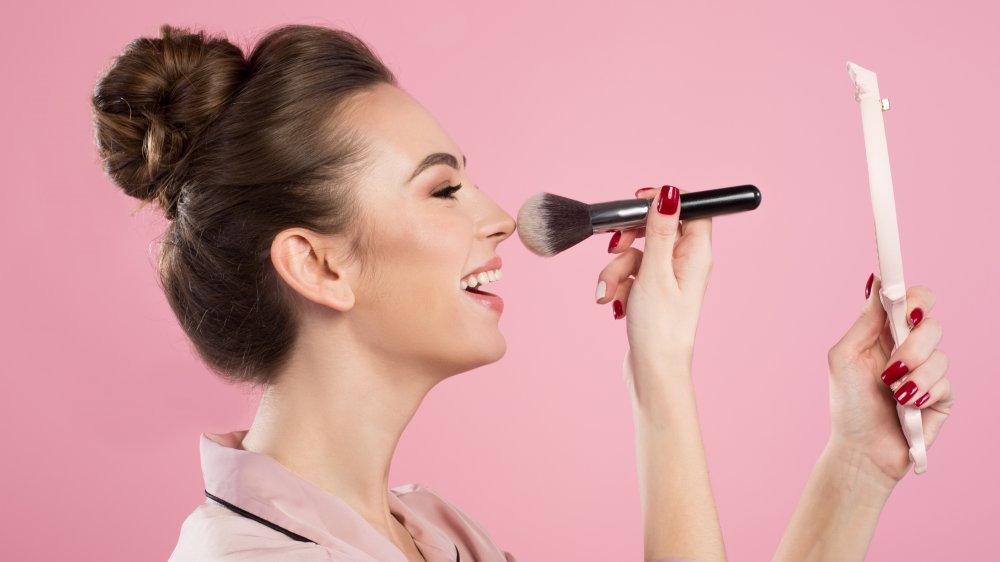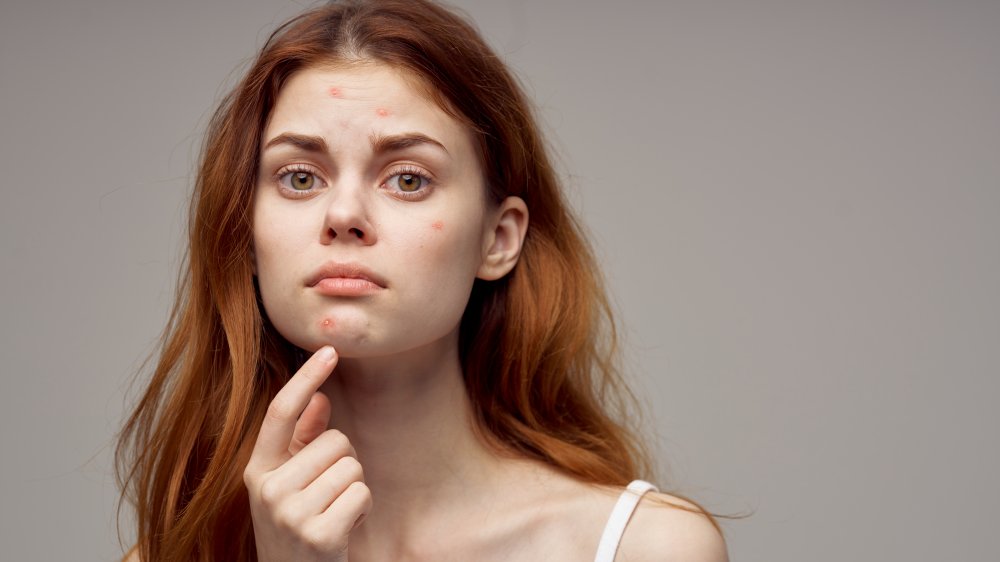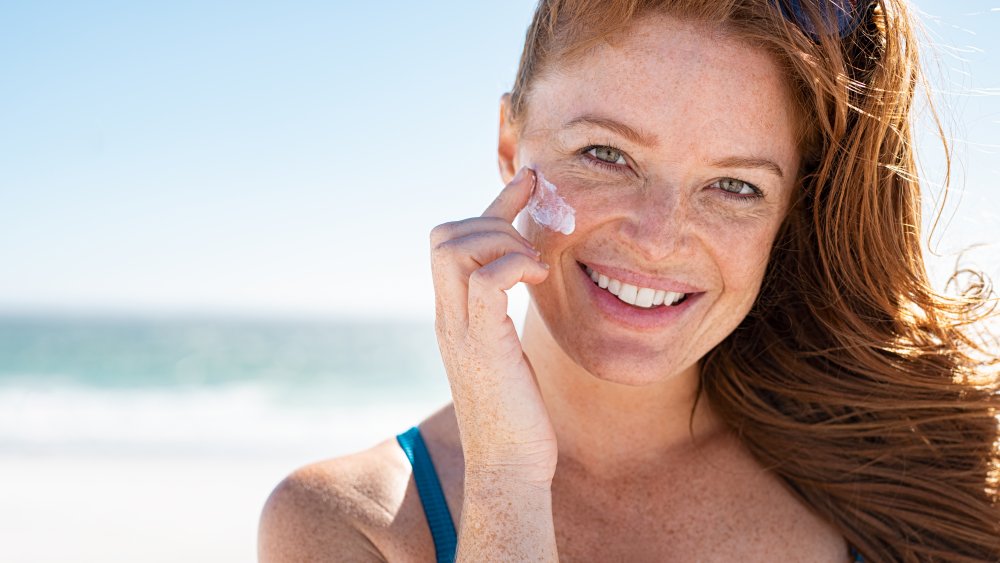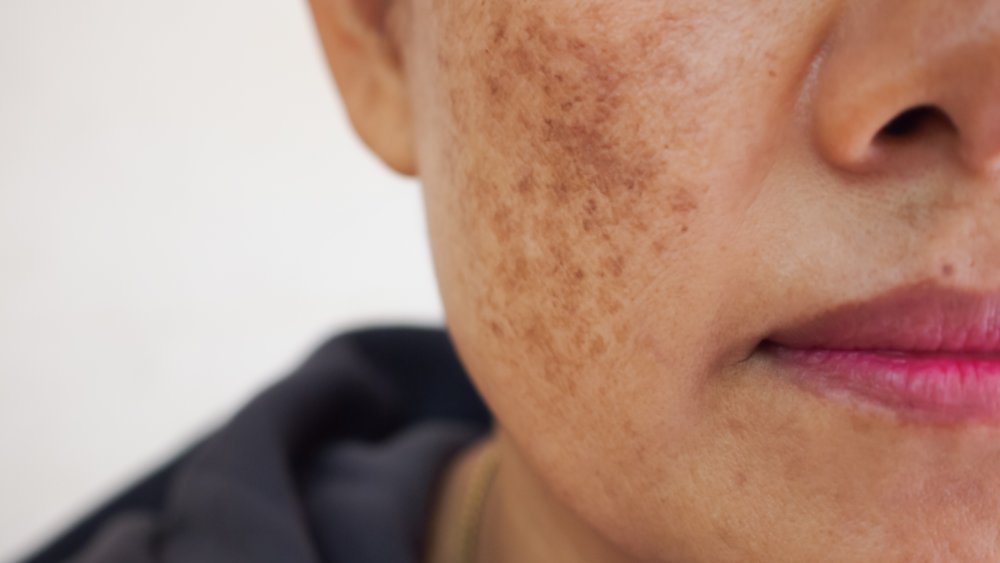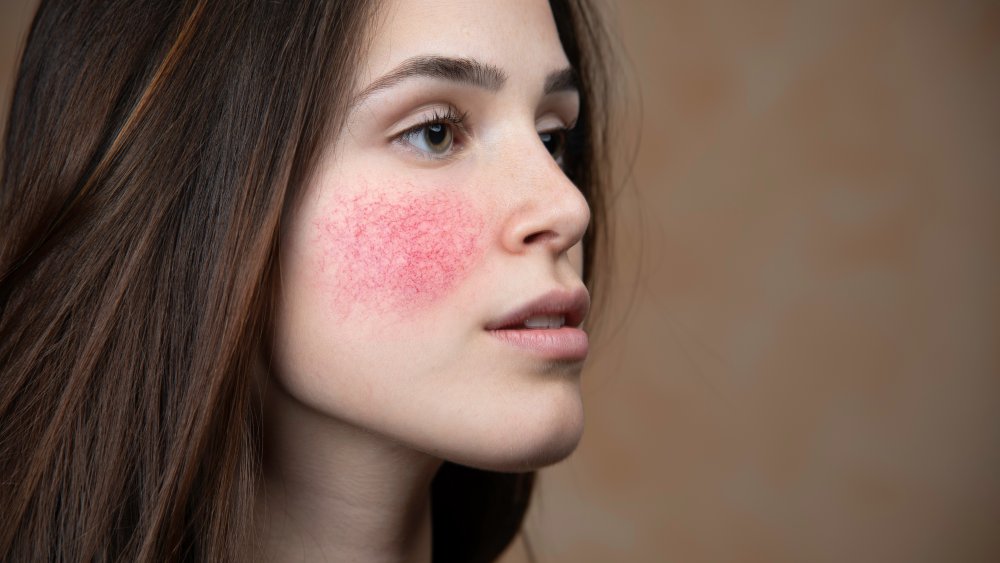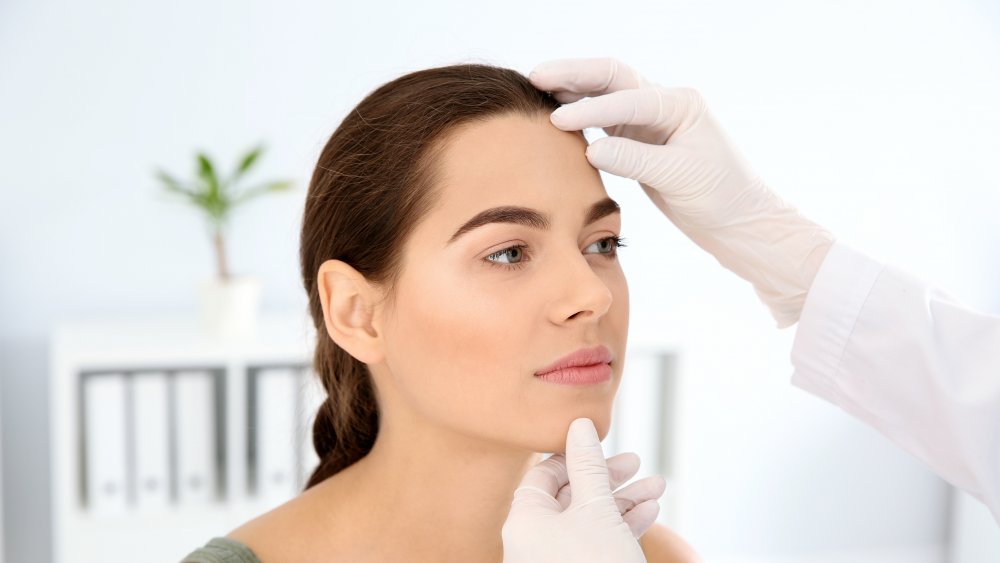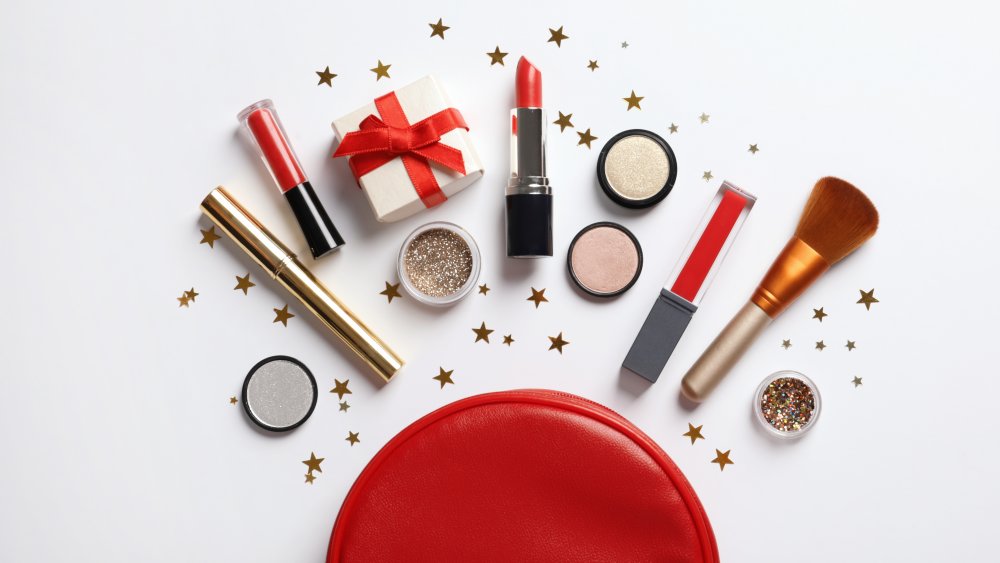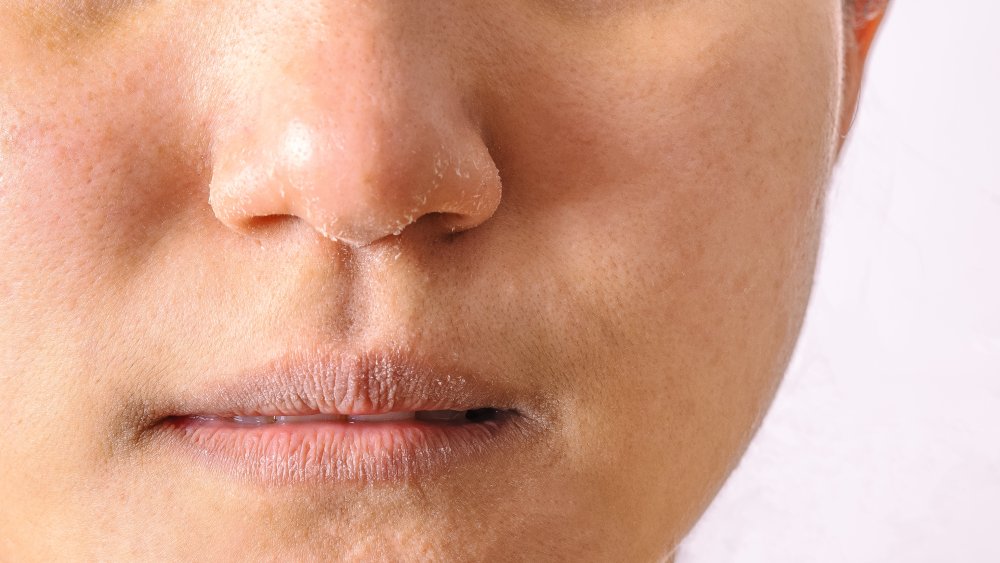When You Wear Makeup Every Day, This Is What Happens To Your Skin
If you wear makeup every day, you don't need us to tell you the power of a good contour or the excitement that comes from finding an incredible sale on a favorite eyeshadow palette. Chances are you already know your way around the cosmetic aisles. Whether you live to experiment with new looks or you just can't imagine leaving the house without at least a swipe of lipstick or mascara, there are some things you may not know about your daily makeup habit.
With blushes to foundations to mascaras and everything in between, the world of makeup is ever-expanding, but have you ever stopped to wonder what's under all that makeup? Specifically, how are all these beauty products affecting your skin, especially when you layer them on each and every day? While Sephora or Ulta may seem like an oasis, your skin may disagree with that notion. Here's exactly what happens — the good, the bad, and the ugly — when you wear makeup every day.
You'll experience breakouts if you wear makeup every day
It may not be too surprising to learn that wearing makeup every day can cause your skin to break out more frequently. However, you may not have realized that the more makeup you apply to your skin, the greater chance there is that those products will cause pimples, especially if you're susceptible to acne.
Unfortunately for makeup aficionados, dermatologists and skincare professionals agree that makeup isn't the best for acne-prone skin. "By putting less makeup on your face, you can improve acne, and there's less of a chance that you'll get blackheads or breakouts," Candace Marino, a medical aesthetician based in California, revealed to Well+Good. Additionally, Joshua Zeichner, celebrity dermatologist and director of cosmetic and clinical research at New York's Mount Sinai Hospital, told NBC News that the "overuse of makeup, especially foundations, can lead to skin irritation or acne breakouts."
This isn't to say that you should stop wearing makeup for all eternity, but you should be aware you aren't doing your acne any favors by wearing it every day.
Wearing makeup every day won't necessarily protect you from sun damage
Protecting your skin from sun damage is one of the most important things you can do for your skin's health. After all, sun damage can lead to premature aging, including age spots, and cause skin cancer. Wearing some form of sunscreen regularly is a great way to prevent that, but even if your makeup says it has SPF in it, that doesn't mean it's going to cut it.
As dermatologist Leslie Baumann told WebMD, "Makeup does not provide enough coverage." In fact, Baumann said that you would "need seven times the normal amount of foundation and 14 times the normal amount of powder to get the sun protection factor on the label." She added, "No one does this." Even if you wear makeup every day and make sure it contains SPF, there's no way you're applying that many layers. If you aren't careful, though, you'll be exposed to the harmful side effects of sun damage. To avoid that, you can continue to wear makeup every day, of course, but you need to put on an SPF before starting on your makeup.
You may notice more wrinkles if you wear makeup every day
Wrinkles are, of course, a common skincare concern. No one wants wrinkles, but they're unavoidable. However, there are certain things you can do to help prevent getting wrinkles prematurely — and then there are also things that you can do that make the possibility of getting wrinkles even more prevalent. Not wearing sunscreen or using tanning beds are some examples. Interestingly, though, when you wear makeup every day, you may also be putting yourself at a greater risk for wrinkles.
According to Women's Health, not washing your makeup off before bed is "basically asking for wrinkles." This is because "the makeup and environmental pollutants you accumulate during the day seep into your pores, breaking down collagen and elastin. This can speed up the aging process and leave you with fine lines and wrinkles." Yes, makeup can lead to wrinkles, but that doesn't have to be the case. If you still use a good skin care regimen, wearing makeup won't necessarily cause more wrinkles than not wearing makeup, you just need to have a solid beauty routine for taking off your makeup at night.
Your skin won't renew itself as well if you wear makeup every day
Is it just us or is renewal all the rage these days? People want to start renewing their vows, or their personal style, or even their mortgages. Of course, renewal is important, but there are some things that actually renew themselves — and not just that monthly subscription you can never remember to cancel. Your skin is capable of renewing itself, but, at the same time, you have to let it do its thing.
According to Well+Good, your skin renews itself in a cycle that lasts about 28 days, sort of like turning over a new leaf. "The application of daily makeup may interfere with that cycle," dermatologist Rachel Nazarian, revealed to Well+Good. "The longer your skin can go without makeup, the better it will regulate your skin's temperature, oil control, hydration, and its natural exfoliation process." If you wear makeup every day — even if you rigorously wash it off at night and follow an intense skincare routine — your skin still won't be able to turn over new cells as it would if you gave your skin a break from the cosmetics.
Wearing makeup every day could prolong a breakout
If you apply makeup in the hopes of concealing a breakout, you should know that wearing makeup every day over top of acne can actually make it more difficult for those blemishes to heal. "It is hard because makeup is used to conceal breakouts, but it actually can also stoke the fire," esteemed dermatologist Mona Gohara told Self. Plus, there's a lot that goes on under the surface when you use makeup on a blemish.
"When you cover up an open zit, you are essentially blocking it from 'breathing' by limiting its exposure to oxygen," Shereene Idriss, a dermatologist at Union Square Laser Dermatology in New York City, told the publication. In fact, Idriss continued, saying that when you put makeup on a pimple, "you are indirectly creating an environment prone to irritations, inflammation and even infections." If you get a blemish, try to resist the urge to cover it up every day — or else you might end up with a bigger zit than the one with which you started.
Wearing the wrong kind of makeup every day can wreak havoc on your skin
Everyone has their own skin type. Maybe your skin is oily; maybe it's dry. You might even have a combination of the two. Whatever your skin type is, though, it's important to choose the right makeup. In fact, if you wear makeup every day and it isn't fit for your skin type, your skin could be in a lot of trouble.
While it might not be "bad" to wear makeup every day, as skin trainer Ariel Enriquez told Verily, it really "all depends on the ingredients in the products, as well as how diligent you are in removing the makeup." Additionally, Joel Schlessinger, a Nebrasked-based dermatologist said you have to make sure "you choose high-quality makeup that is designed for your skin type." In which case, you can get away with wearing makeup on the daily.
If you think your makeup could be causing your skin some upset, Schlessinger recommends taking some time away from the products. "The break will give you a chance to determine what gave your skin the adverse reaction," he explained.
You could have an allergic reaction if you experiment with makeup every day
Even if some of your makeup looks similar to another kind, different brands use different ingredients. And, some of those ingredients are better for your skin than others. In fact, you might not even know you're allergic to certain makeup ingredients until you put them on your skin, at which point you could suffer a terrible reaction.
Now, wearing makeup every day doesn't guarantee you'll have an allergic reaction and, as dermatologist Heather Woolery-Lloyd told The Zoe Report, "The good news is that most people can use makeup without problems." However, "for some people who are highly allergic, makeup can be irritating especially around the eyes and lips," the expert explained. She continued, saying, "Fragrance is the most common ingredient in makeup that can cause an allergy."
To avoid having an allergic reaction to makeup, especially if you love to wear it every day, make sure you do your research on the ingredients in your favorite products. And as Woolery-Lloyd advised, stay away from added fragrances.
If you work out while wearing makeup every day, your skin won't be able to breathe
If you are a fitness fanatic, you likely work out regularly. Whether or not you hit the gym every day, though, there is one thing that you should never do when it comes to getting your sweat on: Don't work out while wearing makeup. Yes, it may be a hassle to wash your face — and, yes, you may not want to be seen in the gym without your makeup — but exercising in makeup is seriously damaging for your skin.
"Makeup forms a barrier on your skin covering your pores, and when working out, your makeup mixes with oil and perspiration, which in turn congests your skin and prevents those pores from being able to release sweat," dermatologist Whitney Bowe told InStyle. "When you work out, your pores and sweat glands open up in order to cool down your body — wearing a full face of makeup can block your pores and glands, hindering your skin's ability to breathe, which in turn can result in breakouts, blackheads and skin irritation." Instead, take off your makeup before working out — and your skin will seriously thank you.
If you don't wash off your makeup after wearing it every day, free radicals can harm your skin
You can find all sorts of makeup products that claim to be good for your skin, but that doesn't mean they're good enough to sleep in. No matter what your cosmetics claim, if you don't wash them off every night, you risk waking up to some unpleasant surprises.
Not only can sleeping in makeup cause acne, it also welcomes free radicals to wreak havoc on your face. Eric Schweiger, dermatologist and founder of the Clear Clinic, explained to HuffPost that "sleeping in your makeup can result in unnecessary exposure to the free radicals in the environment, which the makeup holds on to." Frustratingly, those "free radicals cause the breakdown of healthy collagen, which results in fine lines on the skin," Schweiger continued. Wearing makeup daily and not taking the time to properly take it off means breakouts tomorrow and wrinkles down the line — aka it is not at all worth it.
If you wear makeup near your eyes every day, you could experience redness and peeling
The skin on your face tends to see a lot of wear and tear, mostly from makeup, face products, and pollutants. That's all the more reason you should treat your face with care — especially the skin around your eyes, which is super sensitive. As John G. Zampella, an assistant professor in dermatology at NYU Langone Health, told Self, "Your eyelid skin is the thinnest skin on your body, outside of maybe your genitals." Because of that, it's important to watch out for the makeup you use on or around your eyes. In fact, the Food and Drug Administration actually advises consumers to be watchful for ingredients in eye makeup.
The FDA has a list of color additives that are generally safe for use around your eyes. However, as Self pointed out, the FDA warns that "if there's a color in your makeup that isn't on this list, the company that made it is not obeying the law. Don't use it." Your eyes and the skin around them is delicate, so be careful with what you put on or around them. If you wear makeup every day and you're unsure if it's safe, you could see reactions that range from redness to peeling.
Can wearing makeup every day make you more prone to skin cancer?
No one wants to develop skin cancer, however, it is actually the most common cancer in the world. According to the Skin Cancer Foundation, one in five Americans will develop the disease before they turn 70 years old. It's unknown if wearing makeup could play a role in increasing a person's risk for skin cancer.
According to the American Cancer Society, "there is little evidence to suggest that using cosmetics, or being exposed to the ingredients in cosmetics during normal use of these products, increases cancer risk." However, "because there are no long-term studies, little is known about the health effects of long term exposure to many ingredients in cosmetics."
The society went on to explain, "This means that we cannot claim that these products will not cause health problems in some people." As of this writing, simply not enough is known to draw a link between makeup and skin cancer — nor rule one out.
If you wear makeup every day, you could have an adverse reaction
Many people in the United States are starting to become more aware of the ingredients in the products they use around their houses and on their bodies. Whether it's deodorant, window cleaner, or anything else you use, people aren't too fond of having too many chemicals in their products. The same can definitely be said for makeup because when you wear makeup every day, you're more likely to have an adverse reaction because of the ingredients.
The ingredients in most makeup products aren't as highly vetted as they probably should be. Karen Ballou, founder and CEO of skincare brand Immunocologie, told Bustle, "Unlike Europe and Asia, ingredients in skincare and beauty products are unfortunately not very well regulated in the US." Because of that decrease in regulation, "it's more likely than not you'll find something less than appetizing for your skin and health in many makeup products on the market." In order to avoid this, it's important to do your research and determine if any of the ingredients in your favorite makeup products could cause issues for your skin and health.
Wearing makeup every day can make eczema and psoriasis worse
Skin conditions such as eczema and psoriasis are fairly common. According to the National Psoriasis Foundation, about eight million Americans have psoriasis, including supermodel Cara Delevingne, while an estimated 15 million suffer from eczema, according to the Cleveland Clinic. Still, as common as they are, they're both also incredibly frustrating to deal with, and wearing makeup every day could potentially make them worse and harder to manage.
The director of cosmetic and clinical research at Mount Sinai Hospital in New York, Joshua Zeichner, told NBC News, "Taking a break from makeup can help the skin repair itself." This is especially true "if you have a condition where the skin barrier is disrupted, for example in severe dryness or eczema, not wearing makeup can allow the skin to heal itself," according to Zeichner. But if you do choose to wear makeup every day and suffer from psoriasis or eczema, using makeup and skincare products formulated for your skin type is key. No one wants to make their skin condition worse, so taking care of what's going on under the surface as well is an important step.
